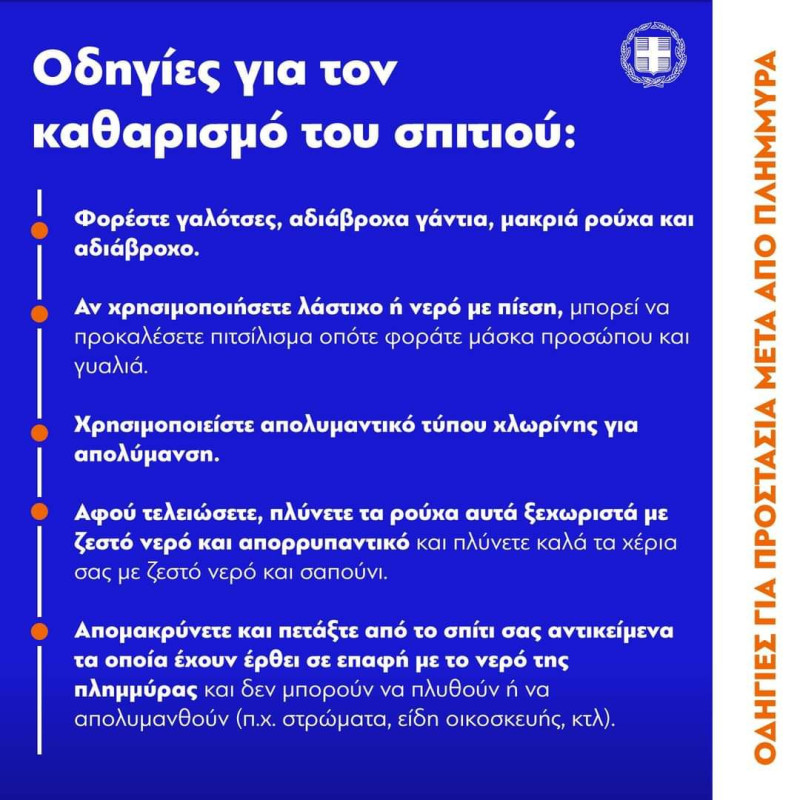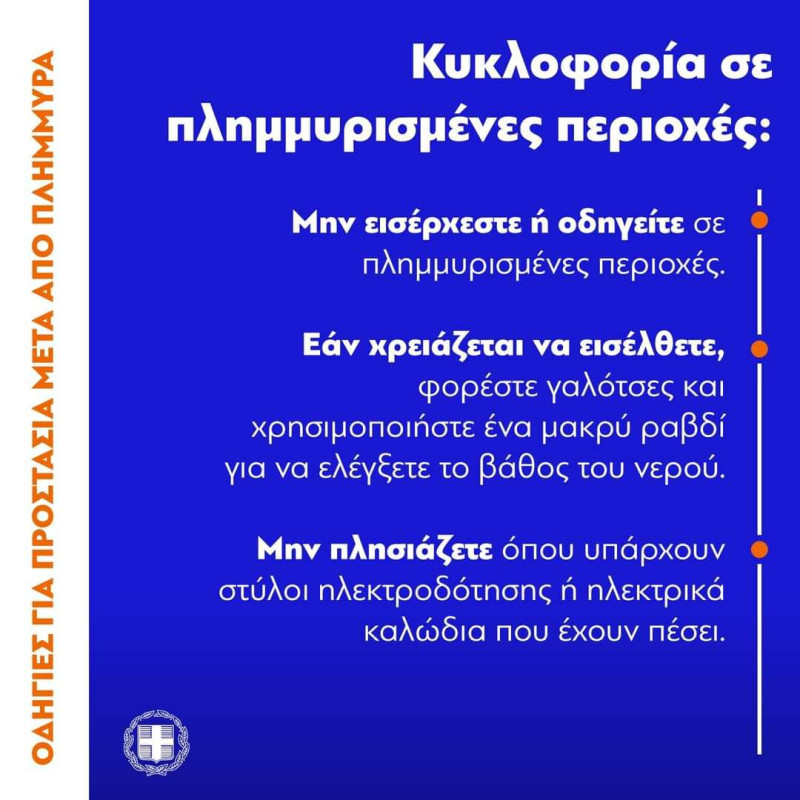The briefing of Deputy Minister of Health Irini Agapidakis from the Business Coordination Center of the Region of Thessaly
The Ministry of Health gives instructions to those affected by the floods in order to protect themselves from possible risks to public health and informs citizens about the rules they must follow regarding the consumption of water and food, cleaning the house and traffic in the flooded areas .
For water and food consumption:
For house cleaning:
For traffic in flood affected areas:
At the same time, deputy health minister Irene Agapidaki from the Business Coordination Center in the Region of Thessaly informs the citizens that:
“Following the updates from the affected areas, today we would like to inform the citizens about very important issues concerning their protection in relation to potential risks to public health.
It is important that citizens do not consume contaminated water. All stagnant and stagnant water must be treated as potentially contaminated. This means we use bottled water for all kinds of work. For our personal hygiene, to drink water, to possibly cook, even for tasks we have to do inside the house.
It is important for citizens to know that in all affected areas checks are being carried out by the competent Public Health Laboratory of the University of Thessaly in relation to water quality and the local authorities announce when it is safe for citizens to have access and to allow traffic to water supply network.
So, until citizens are officially informed by local authorities that the water in the area is safe, they should use bottled water. Equally important is avoiding contact with contaminated water, mud, not letting our pets play in mud or drink water from it because, as we said, we all treat it as potentially contaminated.
It’s important to keep in mind that all these stagnant waters have carryovers that have been washed up all these days by the floods, dead animals, and it’s important to be able to isolate live pets, farm animals, from the areas in which there are dead animals.
In relation to this, citizens who find dead animals that have been swept away by the floods in the various areas are important to notify the Region, the municipalities, the competent services in order to immediately collect the animals and proceed with the burning and burial procedures.
They have already started businesses in this area. An intensive collection of dead animals, both those found in livestock units and those scattered in the various areas, is already taking place in the early hours of today.
It is equally important that when citizens attempt to approach their homes to begin restoration work, they should bear in mind that potentially dead animals, such as rodents, reptiles or even pets that were unfortunately swept away by the flood and are dead, may they are inside their houses along with other portable materials.
Therefore they need to use special equipment, waterproof clothes, wellies, not to come into contact with mud and special attention as in some areas there is electricity, but inside the houses there may be bare wires and we must avoid the risk of electric shock.
I would also like to point out that the Reference Center in the Public Health Laboratory of the University of Thessaly School of Medicine has already set up an epidemiological surveillance system in order to detect outbreaks, such as gastroenteritis or other infectious diseases, due to the stagnant water and the situation that has been created from the floods.
At the moment the situation is under control, but it is important for citizens to consume bottled water, safe food, sealed, pay particular attention to food and water that have not come into contact with mud. If the packaging is cracked or partially damaged, to discard this food and water and not use it.
In relation to mosquitoes, we have already set up sampling points to know exactly what species is present in the affected areas.
We are monitoring the situation. We have already taken measures and if necessary additional measures will be taken. Finally, I would like to say that any kind of medical assistance is already being provided by local medical services, health centers, hospitals, while we are also mobilizing the mobile teams of the EODY to provide additional assistance to the affected, where there is a need.
Needs are already met for medicines, local provision of health services for the elderly, for people facing problems such as, for example, skin rashes, gastroenteritis and so on.
The last point I would like to make has to do with the issues regarding symptoms that citizens in the affected areas may experience. If they notice rashes, fever, cough, headache, diarrhoea, they should immediately contact the medical services of their areas, which, by analogy, respectively inform the Public Health Center so that we can immediately get the information and investigate the etiology of the diseases, in order to know if something is due to a viral cause or another type of cause, so that the necessary measures can be taken on a wider scale”.
Source: Skai
I have worked as a journalist for over 10 years, and my work has been featured on many different news websites. I am also an author, and my work has been published in several books. I specialize in opinion writing, and I often write about current events and controversial topics. I am a very well-rounded writer, and I have a lot of experience in different areas of journalism. I am a very hard worker, and I am always willing to put in the extra effort to get the job done.












